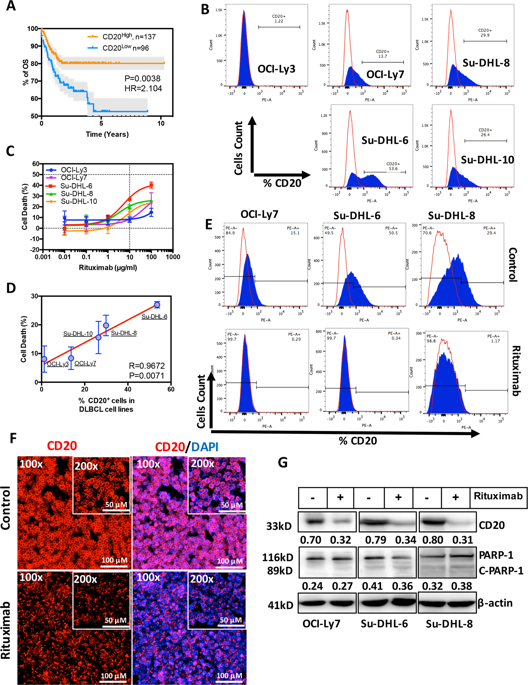当前位置:
X-MOL 学术
›
Cell Death Dis.
›
论文详情
Our official English website, www.x-mol.net, welcomes your feedback! (Note: you will need to create a separate account there.)
Novel HDAC inhibitor Chidamide synergizes with Rituximab to inhibit diffuse large B-cell lymphoma tumour growth by upregulating CD20.
Cell Death & Disease ( IF 9 ) Pub Date : 2020-01-06 , DOI: 10.1038/s41419-019-2210-0 Xu-Wen Guan 1, 2 , Hua-Qing Wang 1 , Wei-Wei Ban 2, 3, 4 , Zhi Chang 1 , Hai-Zhu Chen 1 , Li Jia 5 , Feng-Ting Liu 1
Cell Death & Disease ( IF 9 ) Pub Date : 2020-01-06 , DOI: 10.1038/s41419-019-2210-0 Xu-Wen Guan 1, 2 , Hua-Qing Wang 1 , Wei-Wei Ban 2, 3, 4 , Zhi Chang 1 , Hai-Zhu Chen 1 , Li Jia 5 , Feng-Ting Liu 1
Affiliation

|
Loss of CD20 is a major obstacle for the retreatment of relapsed/refractory diffuse large B cell lymphoma (DLBCL) with Rituximab-associated regimens. Histone deacetylation causes gene silencing and inhibits CD20 expression. Chidamide is a novel inhibitor for histone deacetylases (HDACs). We hypothesize that Chidamide could overcome Rituximab-mediated down-regulation of CD20 and facilitate Rituximab-induced killing. In this study, we determine the mechanism of synergy of Chidamide with Rituximab in DLBCL using in vitro and in vivo models. We found that the levels of CD20 protein surface expression on five DLBCL cell lines were significantly and positively correlated with the sensitivities of cells to Rituximab. Treatment with Rituximab significantly reduced CD20 surface expression at the protein levels. RNA sequencing showed that Chidamide significantly increased expression of more than 2000 transcriptomes in DLBCL cells, around 1000 transcriptomes belong to the cell membrane and cell periphery pathways, including MS4A1. Chidamide significantly increased CD20 surface expression in DLBCL cell lines. Combination with Chidamide significantly synergized Rituximab-induced cell death in vitro and significantly inhibited tumour growth in DLBCL-bearing xenograft mice. A patient with relapsed/refractory DLBCL achieved a complete response after three cycles combined treatment with Chidamide and Rituximab. In conclusion, our data demonstrate for the first time that inhibition of HDACs by Chidamide significantly enhanced Rituximab-induced tumour growth inhibition in vitro and in vivo. We propose that CD20 surface expression should be used clinically to evaluate treatment response in patients with DLBCL. Chidamide is a promising sensitizer for the retreatment of DLBCL with Rituximab.
中文翻译:

新型HDAC抑制剂Chidamide与利妥昔单抗协同作用,通过上调CD20抑制弥漫性大B细胞淋巴瘤肿瘤的生长。
CD20的丢失是利妥昔单抗相关方案治疗复发/难治性弥漫性大B细胞淋巴瘤(DLBCL)的主要障碍。组蛋白去乙酰化会导致基因沉默并抑制CD20表达。Chidamide是一种新型的组蛋白脱乙酰基酶(HDACs)抑制剂。我们假设Chidamide可以克服利妥昔单抗介导的CD20下调并促进利妥昔单抗诱导的杀伤。在这项研究中,我们使用体外和体内模型确定了Chidamide与利妥昔单抗在DLBCL中的协同作用机制。我们发现,在五个DLBCL细胞系上CD20蛋白表面表达的水平与细胞对利妥昔单抗的敏感性显着正相关。用利妥昔单抗治疗可在蛋白质水平上显着降低CD20表面表达。RNA测序表明,Chidamide显着增加了DLBCL细胞中2000多个转录组的表达,其中约1000个转录组属于细胞膜和细胞外围途径,包括MS4A1。Chidamide显着增加DLBCL细胞系中CD20表面的表达。与Chidamide的组合可在体外显着协同利妥昔单抗诱导的细胞死亡,并显着抑制荷DLBCL的异种移植小鼠的肿瘤生长。患有复发/难治性DLBCL的患者在用奇多酰胺和利妥昔单抗联合治疗三个周期后达到了完全缓解。总之,我们的数据首次证明,在体外和体内,Chidamide对HDAC的抑制作用显着增强了利妥昔单抗诱导的肿瘤生长抑制作用。我们建议临床上应使用CD20表面表达来评估DLBCL患者的治疗反应。对于使用利妥昔单抗的DLBCL复治,Chidamide是一种有前途的敏化剂。
更新日期:2020-01-06
中文翻译:

新型HDAC抑制剂Chidamide与利妥昔单抗协同作用,通过上调CD20抑制弥漫性大B细胞淋巴瘤肿瘤的生长。
CD20的丢失是利妥昔单抗相关方案治疗复发/难治性弥漫性大B细胞淋巴瘤(DLBCL)的主要障碍。组蛋白去乙酰化会导致基因沉默并抑制CD20表达。Chidamide是一种新型的组蛋白脱乙酰基酶(HDACs)抑制剂。我们假设Chidamide可以克服利妥昔单抗介导的CD20下调并促进利妥昔单抗诱导的杀伤。在这项研究中,我们使用体外和体内模型确定了Chidamide与利妥昔单抗在DLBCL中的协同作用机制。我们发现,在五个DLBCL细胞系上CD20蛋白表面表达的水平与细胞对利妥昔单抗的敏感性显着正相关。用利妥昔单抗治疗可在蛋白质水平上显着降低CD20表面表达。RNA测序表明,Chidamide显着增加了DLBCL细胞中2000多个转录组的表达,其中约1000个转录组属于细胞膜和细胞外围途径,包括MS4A1。Chidamide显着增加DLBCL细胞系中CD20表面的表达。与Chidamide的组合可在体外显着协同利妥昔单抗诱导的细胞死亡,并显着抑制荷DLBCL的异种移植小鼠的肿瘤生长。患有复发/难治性DLBCL的患者在用奇多酰胺和利妥昔单抗联合治疗三个周期后达到了完全缓解。总之,我们的数据首次证明,在体外和体内,Chidamide对HDAC的抑制作用显着增强了利妥昔单抗诱导的肿瘤生长抑制作用。我们建议临床上应使用CD20表面表达来评估DLBCL患者的治疗反应。对于使用利妥昔单抗的DLBCL复治,Chidamide是一种有前途的敏化剂。



























 京公网安备 11010802027423号
京公网安备 11010802027423号